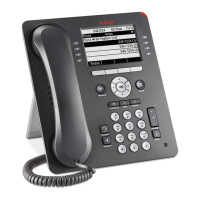Network Requirements
42 Deskphone SIP 9608, 9611G, 9621G, 9641G Administrator Guide Release 6.0.1
Security
For information about toll fraud, see the respective call server documents on the Avaya support
Web site. The 9600 Series SIP IP Telephones cannot guarantee resistance to all Denial of
Service attacks. However, there are checks and protections to resist such attacks while
maintaining appropriate service to legitimate users.
9600 Series SIP IP Telephones support Transport Layer Security (TLS) for signaling and for
secure communications (SRTP). This standard allows the deskphone to establish a secure
connection to a HTTPS server, in which the upgrade and settings file can reside. This setup
adds security over another alternative.
Communications between the SIP deskphone and the Personal Profile Manager (PPM) can
also be secured by setting the CONFIG_SERVER_SECURE_MODE parameter.
FEPORT + 1 (if FEPORT is
even) or FEPORT -1 (if
FEPORT is odd) or the port
number specified in a CNA
RTP test request plus or minus
one, as with FEPORT above
PORTAUD +
1 (if
PORTAUD
is even) or
PORTAUD –
1 (if
PORTAUD
is odd) or
the port
number
reserved for
CNA RTP
tests plus or
minus one,
as for
PORTAUD,
above
RTCP and SRTCP packets
transmitted to the far-end of
the audio connection
UDP
RTCPMONPORT PORTAUD +
1 (if
PORTAUD
is even) or
PORTAUD –
1 (if
PORTAUD
is odd)
RTCP packets transmitted to
an RTCP monitor
UDP
System-specific Any unused
port number
Transmitted signaling
protocol packets
UDP
Destination Port Source Port Use UDP or TCP?
2 of 2

